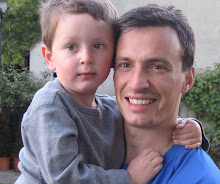 The Statue of Liberty is the only statue in the world to represent an idea and not a person, apparently.
The Statue of Liberty is the only statue in the world to represent an idea and not a person, apparently.So said our softly spoken guide (whose white wavy hair and furrowed brow reminded me of Brookes, the old librarian lag from Shawshank Redemption - minus the pet raven). The statue was given by the French on October 28th, 1886 to commemorate the centennial of the American Declaration of Independance and has come to personify what New York is all about. The famous torch made of 22 carot gold - a reflection of the undying pursuit of freedom, the robe, a symbol of liberty and integrity, the seven points of the crown symbolising the seven seas of the world, the book held in the statue's left hand represents bill of rights which underpins the US constitution and the Roman numerals on the book read 'July 4th 1776' - reminding us of the founding father's vision to build a new nation based on the ideal of democracy.
Today, New York means so many different things to people; Joe Demagio's legacy, $1 Hot Dogs, Madison Square Garden, the Imagine memorial, just about all Meg Ryan films, that day in September 2001...
For me, New York is a testimony to human endeavor and the value of thinking BIG. There is tremendous energy and optimism in the every corner of the city and it is mirrored in the people you meet.
It is one of the most technically advanced and fast moving cities you can visit. And yet not even 250 years ago, Manhatten island (which is the only one of New York's five borough's to have kept its indigenous Indian name) was just a tree-lined and rocky peninsula. Our guide told us that Manhatten has the greatest geological variety of rocks in the world - another dubious factual claim but one which he explained was the reason why it has been possible to build so many buildings in such a concentrated space.
It is undeniable that incredible innovation and creativity have been let loose in New York. When immigrants started pouring into Ellis island after the second world war at the rate of 50,000 per day, it was hard to envisage that these disperate communities could create one of the most vibrant urban environments - ok, i'm going to do it - in the world.
New Yorker's 'can do' approach shames the British 'could do but probably won't do' attitude. In New York i am reminded that it is okay to have wild ambitions and certainly not to fear failure. It is possible to create something that is far beyond our initial imaginings. It takes the commitment of lots of individuals and the shared belief that the today's reality doesn't have to be the same tomorrow.
New York isn't perfect, far from it. But you have to be heart hearted not to appreciate what has been achieved. New York represents more than an idea: it is living evidence of the audacity of the human species to realise their dreams.



